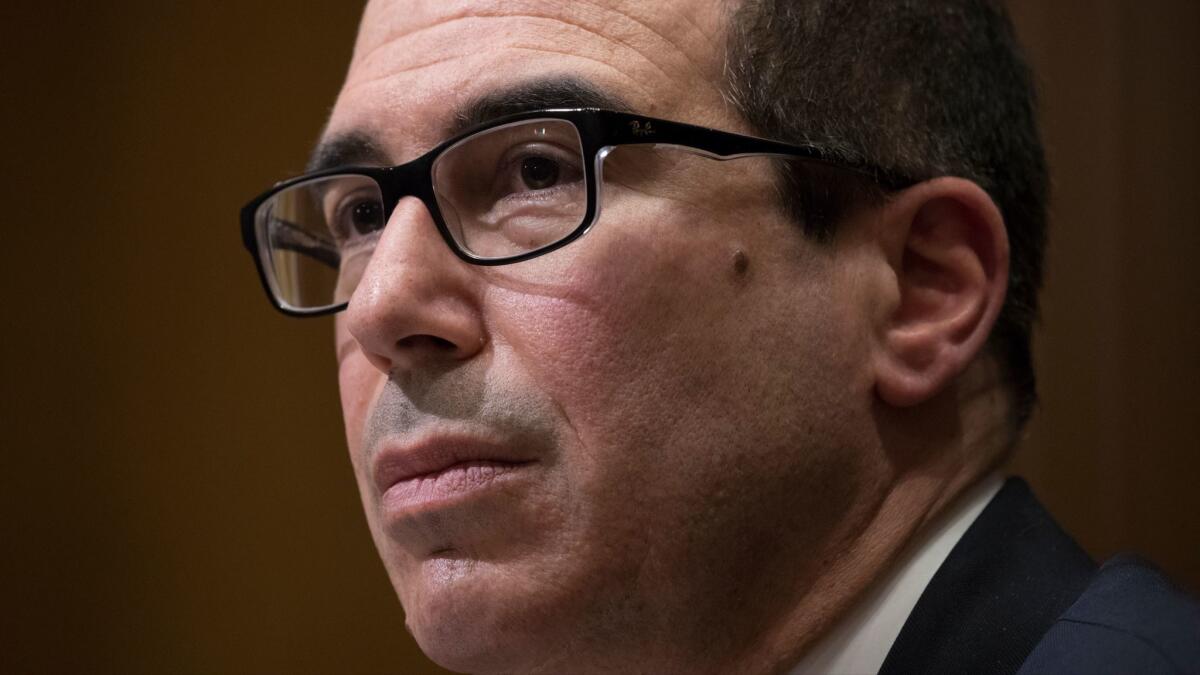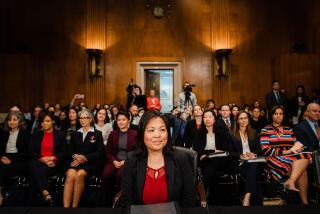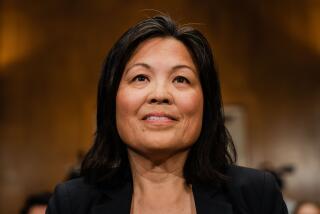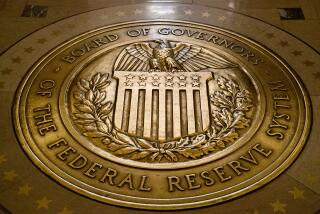Steven Mnuchin wins slim vote for Treasury secretary — now he goes to work on taxes and regulations

Following a bruising confirmation battle that centered on his actions as head of Pasadena’s OneWest Bank, Wall Street executive Steven T. Mnuchin was narrowly confirmed by the Senate as Treasury secretary on Monday.
Mnuchin becomes one of President Trump’s top Cabinet officers. He immediately faces a packed agenda.
The wealthy hedge fund manager and Hollywood movie producer will be a key administration player on boosting economic growth and reducing financial regulations. He takes office with looming deadlines, including a need to increase the debt limit next month and to decide by April 15 whether to label China a currency manipulator and possibly trigger a trade war.
The Senate’s 53-47 vote split along party lines and was one of the slimmest ever for a Treasury pick. All 52 Republicans voted for Mnuchin, joined by only one Democrat, Joe Manchin of West Virginia.
“Under any objective standard, Mr. Mnuchin has ample experience, credentials and qualifications for this important position,” Sen. Orrin Hatch (R-Utah) said Monday, decrying what he called “continual and pointless delays” of his confirmation by Democrats.
Senate Democratic leaders made Mnuchin (pronounced Mah-NEW-shin) one of their leading targets for defeat among Trump’s nominees. At one point, Democrats boycotted a committee vote on his nomination.
“The American people cannot afford to suffer through another financial crisis, and can’t afford to have a master Wall Street manipulator put in the position that we should be relying on to protect us from that kind of financial manipulation,” Sen. Cory Booker (D-N.J.) told his colleagues shortly before the vote.
“We shouldn’t elevate or celebrate people who really fed off of the misery and the challenges of others,” Booker said.
Mnuchin, 54, who was Trump’s campaign finance chairman, has a lot on his plate as head of a sprawling agency that will play a central role in many of the administration’s top initiatives. They include reducing corporate taxes, cutting financial regulations and taking a tougher stance on economic relations with China.
“He has a heavy load in front of him. The president has charged him with many things,” said James Ballentine, executive vice president of congressional relations and political affairs at the American Bankers Assn., an industry trade group. “I can’t even begin to imagine what’s awaiting him on Tuesday morning.”
Mnuchin will arrive at his office, a stone’s throw from the White House, facing a calendar with key dates circled in the coming weeks.
By March 17, Mnuchin needs to persuade Congress to increase the nation’s debt limit. If he can’t, he would have to start using a series of so-called extraordinary measures to extend the deadline for several weeks to avoid a U.S. default on its debt.
The Trump administration is expected to face less resistance from Republicans to a debt limit increase, but there are some conservatives who still might push for budget cuts in exchange for such a move.
On the same day, he’s scheduled to begin two days of meetings in Germany with finance ministers of the world’s advanced economies at a Group of 20 summit, amid a rocky start for Trump on international relations.
By April 15, Mnuchin faces a statutory deadline to inform Congress if the Treasury Department will label China a currency manipulator.
Trump promised during his campaign to direct his Treasury secretary to take that step, which would trigger negotiations to resolve the matter. If those talks fail, the U.S. could levy sanctions that might lead to a trade war.
Keeping currency exchange rates artificially low makes a country’s products cheaper to buy abroad, boosting exports. China has faced allegations of manipulations in the past, but since 2014, financial markets have been pushing down the value of its currency and China has been trying to intervene to keep the value up.
“If confirmed, I intend to review the issue of Chinese currency manipulation,” Mnuchin said in written responses to senators’ questions. “Currency manipulation is a serious infraction of free trade principles and needs to be effectively addressed.”
And by the first week of June, Mnuchin must report to the White House about changes needed to financial regulations under an executive order Trump signed Feb. 3. The order directed the Treasury secretary to consult with regulators and review the Dodd-Frank Wall Street Reform and Consumer Protection Act, which Trump has pledged to dismantle.
Mnuchin told senators that “taking a fresh look at all aspects of the Dodd Frank legislation should be one of our highest priorities.”
“It’s an extremely large agenda,” said Edward Mills, a financial policy analyst at investment bank FBR Capital Markets. “It’s taxes. It’s trade. It’s Wall Street reform. It’s economic growth. It’s China.”
Mnuchin comes with a lot of question marks about his views on key issues, said Aaron Klein, policy director of the Center on Regulation and Markets at the Brookings Institution think tank.
“He has no public policy track record,” said Klein, who was a Treasury official during the Obama administration. “The only thing we know about his policy stances come from his confirmation hearing, which is a pretty limited view into what he might do as Treasury secretary.
Democrats strongly opposed Mnuchin’s confirmation. They said he helped rich hedge fund clients shelter their wealth offshore while at the same time leading a “foreclosure machine” at OneWest.
Mnuchin blamed the large number of foreclosures on bad loans he inherited when he led a group of investors that purchased and renamed the failed IndyMac Bank, which was a leading subprime mortgage lender.
“Since I was first nominated to serve as Treasury secretary, I have been maligned as taking advantage of others’ hardships in order to earn a buck,” Mnuchin told Senators at his Jan. 19 confirmation hearing. “Nothing could be further from the truth.”
Democrats also accused Mnuchin of misleading the committee when he said in his written responses to senators that OneWest did not engage in so-called robo-signing of mortgage documents while he ran it from 2009 to 2015.
Democrats cited a report by the Columbus Dispatch that said its analysis of nearly four dozen foreclosure cases in Ohio’s Franklin County in 2010 showed that the bank “frequently used robo-signers.” A spokesman for Mnuchin denied that he misled senators.
Democrats demanded that Mnuchin answer more questions about robo-signing and boycotted the Senate Finance Committee’s planned vote on his nomination.
On Feb. 1, Hatch, the panel’s chairman, and his fellow Republicans changed the rules that required at least one Democrat to be present for a vote. That allowed Republicans to advance Mnuchin’s nomination to the full Senate.
The U.S. labor force’s guy problem: Lots of men don’t have a job and aren’t looking for one »
How Trump could use the presidency to help his own business interests »
Follow @JimPuzzanghera on Twitter
UPDATES:
5:45 p.m.: This article was updated with a vote breakdown.
4:35 p.m.: This article was updated with the Senate vote and comments from Sen. Cory Booker.
This article originally was published at 12:40 p.m.







